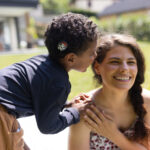MED-EL
Published Apr 19, 2018 | Last Update Mar 07, 2023
What Is Theory of Mind: Children with Hearing Loss

All parents of children with hearing implants want their child to be able to listen and talk, but communication is so much more than that. Communication is social in nature and allows people to share thoughts and beliefs, resolve conflicts and misunderstandings, collaborate to create new ideas, and understand different perspectives. When children are young, it’s difficult for them to know what another person is thinking and feeling – the content of our minds is not visible. As children get older, however, their social intelligence improves and they learn how to interpret and predict the contents of someone else’s mind. This concept is referred to as Theory of Mind: the ability to attribute mental states—beliefs, intents, desires, pretending, knowledge, etc.—to oneself, and to others, and to understand that others have beliefs, desires, intentions, and perspectives that are different from our own.
Children that have a well-developed Theory of Mind understand that others can have beliefs that are different from their own, and that those beliefs can be wrong. For example, Chris thinks Jason is worried about the rain. Chris has a theory about the contents of Jason’s mind, and it may impact the way that he interacts with his friend. In fact, he may even choose to share his umbrella. Children begin developing a Theory of Mind at birth, and it’s critical to developing empathy, taking perspectives, understanding moral rules, developing literacy skills, and building strong friendships.
Many children with hearing loss exhibit delays in Theory of Mind for a variety of reasons.
- They may have trouble overhearing conversations, so they could have fewer opportunities to hear two people sharing their perspectives, feelings and beliefs. For example, a toddler with typical hearing may overhear his mom telling his dad how frustrating traffic was on her drive home from work. A child with hearing loss may not overhear this exchange, and would have fewer opportunities to understand how mom thinks and feels.
- Children with hearing loss often have delayed language which impacts their ability to understand complex social situations. Language about another person’s feelings and thoughts can be complex , and children with language delays may have trouble holding and processing this much auditory information in their brain at once.
- Many parents speak differently to a child with hearing loss than a child with normal hearing. For example, many parents input more concrete vocabulary (i.e. zebra, apple, puzzle) and avoid abstract mental state words (these are words about feelings and thoughts i.e. frustrated, surprised, disappointed) (Morgan & Meristo 2014). This is often in an effort to make the language easier and more accessible to the child with hearing loss, but it limits their exposure to these mental state words, which limits their abilities to understand how others may feel.
Fortunately, there are many things you can do at home to limit the possibility of having a delay in Theory of Mind development.
- Let children hear your thoughts! Exposing your child to the inner workings of your mind shows them that different people have different perspectives. For example, you could say:
- I thought I left my keys on the counter, but they’re not here. I wonder where they are? I’m worried I’ll be late if I don’t find them soon!
- I wanted a burger with pickles, but they didn’t put any pickles on it. That’s so disappointing. I wonder if they ran out? I’m going to go inside and ask if they have more.
- Your brother is coming home from school soon, what do you think he’ll want to play with? Should we get out his favorite toy?
- Participate in “elaborative reminiscing” in which parents elaborately talk about past events that have happened to the child using a variety of mental state words. Talking about past events allows children to see that event from another person’s perspective and provides more opportunities to use abstract vocabulary
- Remember when we went to the zoo last week? You loved the monkeys! They made you laugh! I liked the hippo the best, not the monkeys. Remember when you were scared of the big tiger, how did he make you feel? I could see you were worried. (Taumoepeau & Reese 2013)
- Children can use pretend play schemes to imagine themselves in another person’s shoes, giving them practice at building their Theory of Mind skills. For example, a child and caregiver could pretend to be a doctor and put a Band-Aid on a teddy bear.
- Oh no, bear feels sad because he scraped his knee. I’m the doctor and I can make him feel better. I’m going to put a Band-Aid on his knee and kiss it. He’s not scared of going to the doctor anymore.
- Incorporate more mental-state vocabulary into the books you’re reading. For example, while reading “Sam I Am”, you could say,
- Sam does not like green eggs. I think he wants to eat something else. What are some foods you don’t like to eat? Do you think he’ll eat them in the house? What about on the boat?
If you would like to know more about Theory of Mind (ToM) and emotional intelligence, you can download ‘Thinking Together to Mind the Gap’. This free material offers detailed information about the development of ToM skills and how ToM is related to listening and language. It also includes ideas and resources that can be used to develop these skills with children. This material is available here in English, Dutch and German.
Last updated on June 11, 2021.
MED-EL
Was this article helpful?
Thanks for your feedback.
Sign up for newsletter below for more.
Thanks for your feedback.
Please leave your message below.
Thanks for your message. We will reply as soon as possible.
Send us a message
Field is required
John Doe
Field is required
name@mail.com
Field is required
What do you think?
© MED-EL Medical Electronics. All rights reserved. The content on this website is for general informational purposes only and should not be taken as medical advice. Contact your doctor or hearing specialist to learn what type of hearing solution suits your specific needs. Not all products, features, or indications are approved in all countries.
MED-EL


